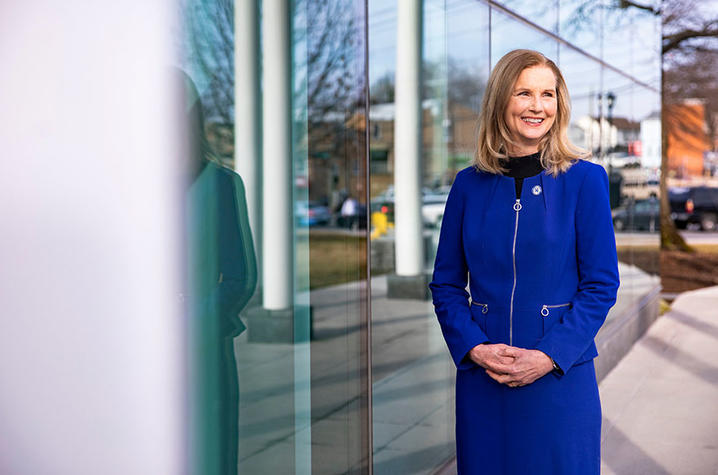A Conversation with Donna Arnett and Other College of Public Health Experts

LEXINGTON, Ky. (Feb. 3, 2022) — Living in a pandemic has been an adjustment for everyone. Public health plays a larger role in the average person’s life now than it ever has before. But what exactly does that mean? The field of public health is constantly growing and changing, but one thing remains – public health exists to keep communities safe. Public health professionals exist to help others.
UKNow sat down with University of Kentucky College of Public Health Dean Donna Arnett, Ph.D., to discuss the different fields within public health and how each of them contributes to worldwide wellness. We also gathered input from Anna Hoover, Ph.D., assistant professor of preventive medicine and environmental health, and April Young, Ph.D., associate professor of epidemiology.
UKNow: In your words, what is public health?
ARNETT: “I think the easiest description of public health that resonates with the minds of people who are not medical is that medicine is really all about treating an individual patient. Finding out what’s wrong with that patient, and then finding the right treatment option. In public health, we’re really trying to look at what causes diseases in populations, so that we can go about preventing those diseases. If you think about everything that touches a population, public health is in all of those areas.”
HOOVER: “Public health supports communities, policymakers, and practitioners in developing and using tools to minimize disease and improve wellness. In short, public health strives to protect health among people and communities around the world.”
YOUNG: “Public health inherently recognizes that the world is connected and that the health of one community inherently affects the health of others.”
The College of Public Health has six main departments: Biostatistics, Epidemiology, Gerontology, Health, Behavior & Society, Health Management & Policy and Preventive Medicine & Environmental Health. Arnett fell in love with epidemiology during her time as a nurse.
“That’s where I discovered and fell in love with research, specifically epidemiology research,” said Arnett. “Epidemiology is the foundational science of public health. It really teaches you how to design research studies, and how to ask questions and answer them in a valid way. It was my 'light bulb' moment.”
UKNow: How is the work of your field helping the people of Kentucky?
YOUNG: “Kentucky has been an epicenter of the substance use epidemic for decades. We are working to reduce the harms associated with substance use, support entry into treatment, and meet people who use drugs where they are without judgment to address their most pressing needs. We have witnessed an unprecedented surge in overdoses during the COVID pandemic and our team has been working to address these. We have fast-tracked efforts to provide overdose education and naloxone (Narcan) to people at highest risk for overdose.
ARNETT: “We're very strong in the areas of both cancer prevention and epidemiology, as well as in substance use disorders. The issues that we face in Kentucky from a health perspective are so dramatic. From Eastern to Western Kentucky, we have a 10-year difference in life expectancy on average. So having that much disparity in health in our Commonwealth really does provide this natural laboratory to do this kind of research.”
HOOVER: “In Kentucky, multidisciplinary environmental health teams are working statewide to identify community concerns, understand how environmental exposures may be contributing to those concerns, and help develop strategies to minimize environmental impacts on health. For example, NIH-funded researchers are studying how we can detect the SARS-CoV-2 virus in wastewater to help inform community testing and mitigation strategies; how to identify and reduce potential exposure to disinfection byproducts in rural water systems; and how to empower residents to detect and reduce radon in their homes.”
UKNow: How has the work in your field impacted the fight against COVID-19?
HOOVER: “Since environmental health is inherently an interdisciplinary field that brings together bench scientists, population health researchers, civil and environmental engineers, and clinicians, our field has been ideally suited to study and address the complexities of COVID-19 transmission. Additionally, environmental health scientists and practitioners have a great deal of experience translating scientific findings to a variety of audiences, including other researchers, policymakers, health care workers and community members.”
Arnett says that just about any undergraduate degree can lead to a career in public health. Now more than ever, the field of public health needs workers committed to making big changes in their communities. At its core, public health is about people.
“The goal is always the same – to improve the health of the communities we serve,” said Arnett.
Learn more about the University of Kentucky’s College of Public Health at cph.uky.edu
As the state’s flagship, land-grant institution, the University of Kentucky exists to advance the Commonwealth. We do that by preparing the next generation of leaders — placing students at the heart of everything we do — and transforming the lives of Kentuckians through education, research and creative work, service and health care. We pride ourselves on being a catalyst for breakthroughs and a force for healing, a place where ingenuity unfolds. It's all made possible by our people — visionaries, disruptors and pioneers — who make up 200 academic programs, a $476.5 million research and development enterprise and a world-class medical center, all on one campus.




